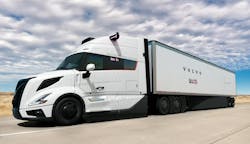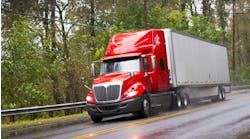Waabi’s autonomous driving system will be steering Volvo’s VNL Autonomous trucks into the future.
The AI startup is sharing details about its go-to-market partnership with Volvo Autonomous Solutions' self-driving Class 8 trucks. Commercial pilots are starting in Texas in 2025, where VAS is already moving freight for DHL Supply Chain.
“Now Waabi has the full path to scale our technology,” Raquel Urtasun, founder and CEO of Waabi, told FleetOwner. “We are launching driverless by the end of the year. We have a superior virtual driver that can scale much better than anybody else in the industry.”
See also: NHTSA proposes exemptions tailored for autonomous vehicles
She said that the startup’s driving system separates itself from AV competitors by calling itself “next-generation AV 2.0” and using novel deep learning applications.
Waabi Driver stands out
Many startups are eager to say their solution is better than their competitors. But Waabi’s word carries weight: Urtasun has led AI and autonomous vehicle development for decades.
In addition to founding Waabi, Urtasun is a computer science professor at the University of Toronto and co-founder of the Vector Institute for AI. She previously worked as chief scientist for Uber’s advanced technologies group and as Canada Research Chair for machine learning and computer vision. Urtasun holds high accolades from NVIDIA, Amazon, Google, the Ministry of Education, and the province of Ontario.
The company said its ADS, the Waabi Driver, will be capable of Level 4 SAE driving autonomy. The startup designed its driving system using deep learning techniques found in the latest revolutionary products in generative AI.
See also: Fleets explained: Autonomous vehicles
Waabi even referred to its driver as a “generative AI model.” But fleets won't be buying a copy of ChatGPT in the future Volvo VNL Autonomous: the model “generates” predictions for its environment using techniques like those of the ubiquitous AI chatbots.
“The way that it learns about the world is by learning to generate that world,” Urtasun said. “That’s the generative AI piece.”
Similar to how large language models use complex architecture, training, and context to predict the next word in a sentence, Waabi’s autonomous driving system can predict possible future observations.
“It can interpret what it has seen, it can understand what’s going to happen through all the possibilities, it can understand the actions that it can potentially do, and then it’s going to pick the answer that is safest to do,” Urtasun explained.
The company also said that its Waabi Driver is an interpretable and verifiable AI model—meaning that its decision-making processes are understandable, and its output is highly reliable.
What’s next?
Volvo is vertically integrating Waabi’s ADS into the Volvo VNL Autonomous during production at the New River Valley assembly plant in Virginia. Volvo told FleetOwner it is still integrating Aurora's autonomous technology into the Volvo VNL Autonomous.
Though Volvo plans to launch commercial driverless operations in Texas in 2025, it has not yet announced participating carriers.
The companies' partnership began when Volvo supported Waabi’s startup journey two years ago. Volvo Group Venture Capital became a strategic investor in the company in January 2023 and later invested in the company’s $200 million Series B round.
“Waabi is at the forefront of developing self-driving technologies leveraging the full power of AI,” said Shahrukh Kazmi, chief product officer at Volvo Autonomous Solutions. “We are excited to integrate Waabi's cutting-edge technology into our autonomous truck platform and work together to jointly develop a safe, efficient, and scalable autonomous transport solution."






